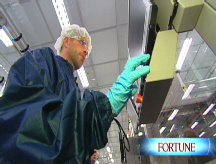Betting on climate change
Investor Daily: Businesses that work to offset global warming could be safer bets in a recession.
SAN FRANCISCO (Fortune) -- With markets whipsawing day to day, and former blue chip companies in tatters, what investors want is a safe haven for their money. Ironically, climate change, that global environmental trend that could bring about the end of not just the stock market but civilization as we know it, may be that haven, suggests a just-released report by Deutsche Asset Management, the asset management arm of Deutsche Bank.
"The current economic downturn presents governments with a historic opportunity to climate proof their economies as they upgrade infrastructure as a core response to the economic downturn," writes Mark Fulton, global head of climate change investment research for Deutsche Asset Management.
The argument Fulton and his colleagues put forth is that sectors that play in the climate change world, including clean energy, emissions technology, transportation and water among others, possess more reliable earnings going forward because of what they view as inevitable government support. Not only that, the market is huge.
The International Energy Agency estimates that about $45 trillion will be needed between now and 2050 to bring new clean-energy technologies to market. Some of that money will come from investment by private equity shops and venture capital, but vast amounts will come from government, as reliable a source as you are going to find in these panicked economic times.
"Climate change has a built-in advantage over most other sectors," Fulton writes. "Its regulated markets hold the promise of enormous secular growth. In the long-term, the earnings of companies and projects that are supported by governments for policy reasons are more trustworthy - there is, in short, a significant safety net effect here."
No sector has been spared the recent bloodbath in the markets, but companies that are part of the overall climate change umbrella have been particularly savaged. Just look at the Claymore/MAC Global Solar Energy Index (TAN), an ETF comprised of global solar companies. It's down 65% since it started trading in mid April, more than twice the decline of the Nasdaq during the same period. But if you believe in the long-term fundamentals of alternative energy, and the markets that will evolve around carbon trading, now is the time, in other words, to go out and look for some bargains. "At sector level, there have been signs of inflated valuations, with solar being the most noted example," the report states. "That is now disappearing and the credit crisis correction looks to be delivering attractive valuations given strong regulatory support."
There are of course several things that could go wrong. Oil and natural gas prices could fall farther than they already have, which makes alternative energy less attractive. Financing is of course, hard to come by, and many of the projects that fall under the climate change rubric need that financing - including wind and solar at the utility scale. So if governments don't step in, those projects are dead in the water. Then again, if nothing is done about climate change, so are we all. ![]()
-
 The retail giant tops the Fortune 500 for the second year in a row. Who else made the list? More
The retail giant tops the Fortune 500 for the second year in a row. Who else made the list? More -
 This group of companies is all about social networking to connect with their customers. More
This group of companies is all about social networking to connect with their customers. More -
 The fight over the cholesterol medication is keeping a generic version from hitting the market. More
The fight over the cholesterol medication is keeping a generic version from hitting the market. More -
 Bin Laden may be dead, but the terrorist group he led doesn't need his money. More
Bin Laden may be dead, but the terrorist group he led doesn't need his money. More -
 U.S. real estate might be a mess, but in other parts of the world, home prices are jumping. More
U.S. real estate might be a mess, but in other parts of the world, home prices are jumping. More -
 Libya's output is a fraction of global production, but it's crucial to the nation's economy. More
Libya's output is a fraction of global production, but it's crucial to the nation's economy. More -
 Once rates start to rise, things could get ugly fast for our neighbors to the north. More
Once rates start to rise, things could get ugly fast for our neighbors to the north. More








